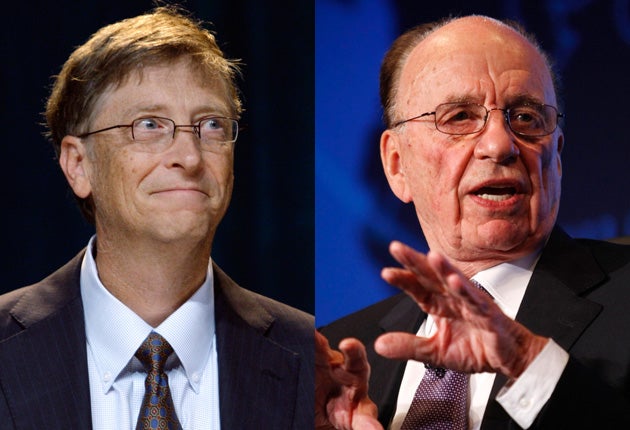Murdoch turns to Gates for website help
Microsoft and News Corp joins forces in bid to make internet news pay

Your support helps us to tell the story
From reproductive rights to climate change to Big Tech, The Independent is on the ground when the story is developing. Whether it's investigating the financials of Elon Musk's pro-Trump PAC or producing our latest documentary, 'The A Word', which shines a light on the American women fighting for reproductive rights, we know how important it is to parse out the facts from the messaging.
At such a critical moment in US history, we need reporters on the ground. Your donation allows us to keep sending journalists to speak to both sides of the story.
The Independent is trusted by Americans across the entire political spectrum. And unlike many other quality news outlets, we choose not to lock Americans out of our reporting and analysis with paywalls. We believe quality journalism should be available to everyone, paid for by those who can afford it.
Your support makes all the difference.Just as soon as the outline of a possible new model for newspapers to make a better return from content used by aggregator and search-engine sites such as Google emerged, new doubts surfaced that publishers can do anything to plug a dam that has already burst in trying to limit free access to their product.
Google is at the centre of the debate once again after reports yesterday that Microsoft, which this year launched its rival search engine Bing, had entered talks with Rupert Murdoch of News Corporation to begin paying for top index content from his newspapers, including The Times and The Wall Street Journal, on its pages.
According to a report in The Financial Times, Bing would agree to the payments system on condition that Mr Murdoch takes steps to remove all his content, or links to his content, from Google.
Freezing out Google is something Mr Murdoch has already been talking about as he looks for ways to erect a pay-wall around the websites of all his publications, which also include The New York Post and The Sun.
Bing entering the fray could encourage Mr Murdoch to go forward. And, at first sight, it may offer the newspaper industry a glimpse of a not-so-gloomy future, with Microsoft offering a significant new stream of revenue to pay for their continuing high costs.
But Google yesterday responded with a verbal shrug. "Publishers put their content on the web because they want it to be found. Google is a tremendous source of promotion for news organisations, sending them about 100,000 clicks every minute. So very few choose not to include their material in Google's index. But the publisher is in control – if they ask us not to include their content, we won't," the company said.
Implying that it had its own doubts about the viability of what Bing may be offering in terms of payments to newspapers, Google added: "We work closely with the newspaper industry to help find long-term and sustainable models for making money from news."
It is widely assumed that Microsoft will be looking to strike a deal not only with Mr Murdoch, even though his stable of publications is extensive and his influence on the industry unquestionable, but with other large publishers as well.
Its notion of Bing becoming the first stop for web users looking for news articles instead of Google would presumably work only if a critical mass of publishers were persuaded to turn their backs on Google all at once.
But most industry observers saw flaws here. As well as wondering if Microsoft would have sufficient funds to offer payments to all the publishers it would need on board, they also questioned the wisdom of Mr Murdoch in attacking Google in a way that essentially attempts to close one of the biggest windows into internet content.
"The key thing is that none of this does anything to help users," argued Mike Masnick of the influential website Techdirt. "And these days, that's a strategic error. If your business is focused on making life more difficult for a competitor, rather than adding more value to users, you're doing the wrong thing."
A significant bucket of ice water was also thrown on Mr Murdoch's putative strategy during a London conference last week by Biz Stone, co-founder of Twitter. He accused the media magnate of attempting to "put the genie back in the bottle" when it comes to open access on the internet to editorial content.
Join our commenting forum
Join thought-provoking conversations, follow other Independent readers and see their replies
Comments